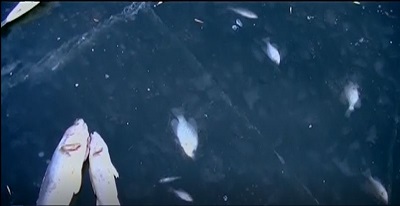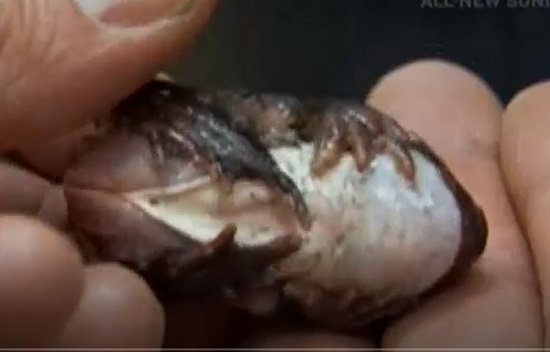|
|
|
Well here we are at another February 12th - formerly celebrated as Lincoln's birthday, now many are trying to get people to think of Darwin's birthday. While some are celebrating "International Darwin Day", other's are sharing "Question Darwin Day", an initiative inspired by CMI with ongoing promotions by The Question Evolution Project. Rational Faith is obviously part of the latter group. So for this year's Question Evolution Day, our questions will be concerning the frozen frog you see in the picture above. You may think this is just an ordinary frozen frog, but I'm going to warn you up front about this - this is no ordinary frog. As Ray Comfort might say, this is an evolutionist's nightmare. This is the Alaskan wood frog. And it is able to survive the harsh sometimes 40 degrees below zero winters. How? it digs a burrow and allows itself to freeze. Solid. Like a block of ice - like you see above. Then when spring arrives, and things begin to thaw - it does too. And wakes up. And hops away - like nothing even happened.
I don't think I can really do it justice with such a brief description, so here's a video[1] with more detail. A Transcript of the salient parts follows.
Video - The freeze surviving Alaskan Wood Frog
Partial Transcript:
| [Prof. Randy Cerveny,
Meterologist] Randy: "The
winter times in Alaska can be brutal. With temperatures
plummeting as much as 40 degrees below zero. To combat those
conditions it has developed a defense mechanism." |
Let's list some of the features that evolution must explain, then think about whether evolution can actually explain them:
- A change in not just 1, but 2 different chemicals levels in the cell.
- This change happens not in 1 or 2 organs, but it's at the cellular level which means it's throughout the Body. Clearly there's been new information added to the frog's DNA to produce such a change.
- The ability to trigger bodily functions to shut down, including the heart
- The ability to start those functions again automatically when it's warm
- And especially the ability to restart the heart that has been stopped for months.
So what mechanisms does neo-Darwinism offer to make these changes? There's only two: Natural Selection and random mutations. Natural Selection is no help here. If an ability is not already present, it's not available to be selected. For example, if we freeze a human solid, verify the heart is stopped, keep it frozen for a number of months and defrost it, we would have no expectation that the frozen body would then wake up. The individual dies, and there's nothing for natural selection to select. And even if there were one trait it could select - like increased glucose or increased urea - how could it select all the needed traits? And how would the body be programmed to shut down the organs while freezing, and then wake them up again at the proper time? That's beyond the capability of natural selection. It is, as the narrator says, a miracle - something that God does.
What about mutations? Can random mutation provide the needed changes and the needed additional information? Clearly not because as molecular geneticist Georgia Purdom explains here, mutations cannot add genetic information, they can only remove it, or change what's already there. Plus such changes are random, not designed, not applied with a purpose. How could all the needed changes take place simultaneously - the cellular changes, the system changes to allow bodily system to shut down and start backup? The ability to survive with the heart stopped?
This failure of evolution is even more striking when you consider another phenomenon described in the same episode.[2] They report on an unexpected event at Lake Owasso, Minnesota in 2013 regarding the below frozen fish.

Though these fish are frozen in ice, they didn't die by freezing. The freezing came after they died. What killed them, climate scientist Elizabeth Burakowski tells us, is an over saturation of oxygen in the water. In normal conditions in the winter, the surface of the body of water they're in freezes over. This allows snow to cover the frozen surface, decreasing the sunlight penetrating into the water. This decrease in sunlight decreases the oxygen produced by algae. But if there's no snow cover, light streams through the ice, and oxygen production by algae continues. And with ice on the surface of the water it has no place to go, so it super-saturates the water. The fish take in the extra oxygen, which creates oxygen bubbles in their blood vessels which clogs the vessels and the fish die.
This is where two facts about evolution become readily apparent:
1. Evolution is nothing but story telling
Though they repeatedly talk about "adaptation" in the case of the frogs, they have no scientific explanation for the adaptations. This frog is a prime example of the fact that "survival of the fittest" cannot explain the arrival of the fittest. And what about the fish? Why don't we see fish adapting? When will their enhanced survival skills arise? No doubt evolution supporters will say something like, we don't have enough time to see the entire process. Or since variations are random, those aren't the type of predictions evolution makes. Which brings up the next point:
2. Evolution is not science
Evolution did not and could not predict the ability in the frogs. It can't predict whether fish will ever "adapt" an ability to be immune to super saturation of oxygen in the water. And unlike real experimental science, nothing significant about evolution can be observed.
So here are my questions for Question Evolution day 2020:
- Why is evolution considered "science" and treated as an operational science when it offers no scientific explanations for what it claims happens? All it offers are "just so" stories.
- Why do evolutionists think we haven't noticed that the just so stories they give to explain features offer no real science? When are they going to start offering scientific explanations instead of just so stories made to fit what they have already observed?
- Why, when evolution can't explain something beyond the ability for natural selection and random mutation to produce, do they call it a "miracle of nature" when nature can't purpose to do anything or design anything? Everyone knows that miracles are in the exclusive purview of God. It's clearly apparent they have an agenda to deny there is anything divine affecting biological processes and outcomes. Otherwise they'd state it as it really is, not a miracle of nature, but a miracle of God.
- Why do evolutionists insist
evolution is science when it does not and cannot follow the
scientific method? Namely:
- Make observations - in this case - of evolutionary phenomena
- Make predictions about those phenomena
- Define criteria to test and affirm or falsify the prediction
- Design and perform experiments to test the prediction
- Evaluate to determine if predictions are verified by results
- The changes required for things
like the ability to be frozen, have a heart stopped for months, and
restart, allowing the creature to awake alive as if nothing
happened, etc. requires changes that can be achieved only through an
increase in information in the design of a creature. Why can't
evolutionists admit that evolution can't - even in theory - produce
the needed increase in information? As philosopher of science and
well known intelligent design advocate Stephen Meyer puts it:
“…There is no naturalistic explanation, no natural cause that produces information. Not natural selection, not self-organizational processes, not pure chance.”[3]
These are the questions put to evolutionists. But I'm not holding my breath for an answer. Indeed, if an evolutionist answers at all, I expect it will be the normal misdirection they typically engage in as I point out in Games Evolutionists Play.
Duane Caldwell | February 12, 2020
Follow @rationalupdates
Notes
1. Strangest Weather
on Earth - episode "Worldwide Weather Wipeouts", Weather Channel
Documentary, 2015
Back
2. Strangest Weather
on Earth - episode "Worldwide Weather Wipeouts"
Back
3.
Stephen Meyer, referenced from Unlocking
the Mystery of Life, Illustra
Media DVD Documentary, 2003
Back
Images
Frozen Frogs and Fish, Pioneer Production's
Strangest Weather on Earth - episode "Worldwide Weather
Wipeouts"
